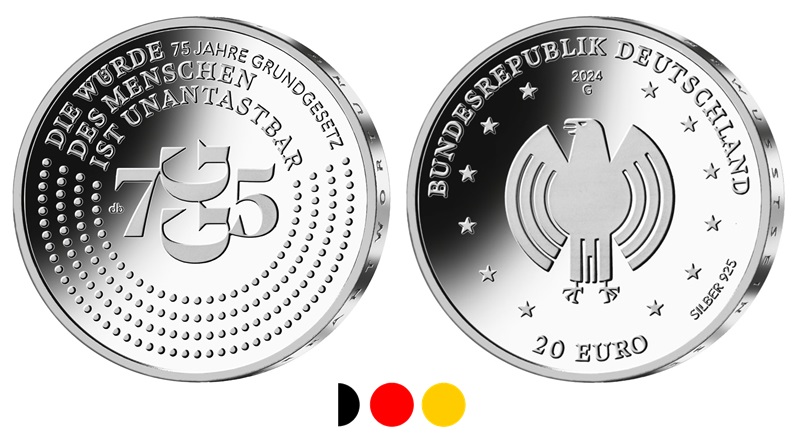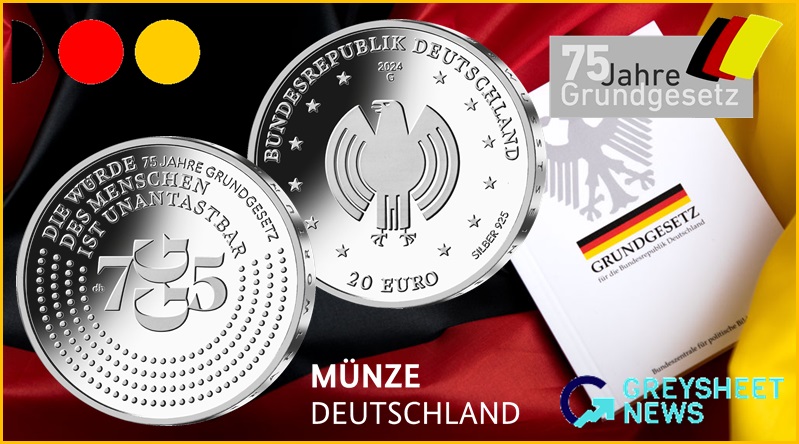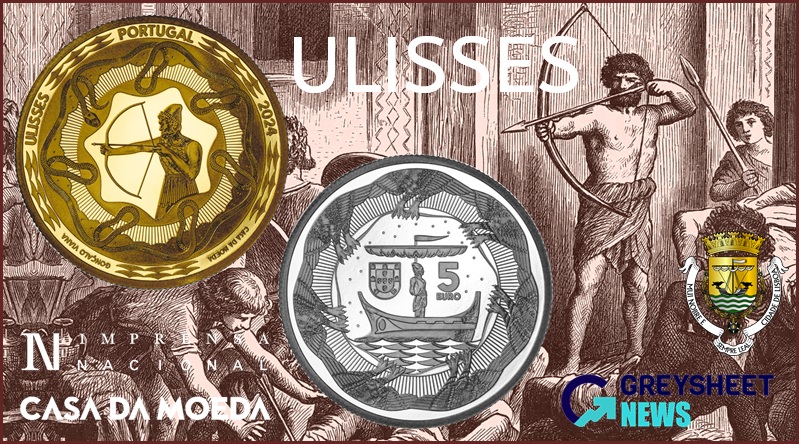Germany: New €20 Silver Proof Coins Released Marking 75th Anniversary Of The Basic Law Declaration
The German Finance Ministry have released new commemorative silver coins marking the 75th anniversary of the adoption of the Basic Law declaration.
The Basic Law unites and defines German fundamental rights such as freedom, the rule of law and democracy. These fundamental rights are not self-evident which makes it all the more worthwhile to stand up and fight for them. The Basic Law does however provide certain guarantees, but filling them with life is the task of all citizens. With the unconditional surrender of the Third Reich in May 1945 ending the Second World War in Europe, the country was in utter chaos with no leadership and a defeated government. The Third Reich had brought not only Germany but most of Europe into a disastrous war of almost complete destruction and countless deaths in the millions. As Germany was now occupied by Allied forces, they divided the country into four sectors of immediate administration. Those divisions were under the control of Great Britain in the northwest, France in the southwest, the United States in the south and the former Soviet Union in the east. Eventually, the three sectors in Western Germany united to form what then became the Federal Republic of Germany in 1948. However, the eastern sector fell under the influence and control of the former Soviet Union with a communist authoritarian government which lasted until 1990.
The need to form a workable government under occupation and to begin a plan to rebuild much of the country and restore German society free from Nazi influence and conditioning, much had to be done from the ground up – including the formation or foundation of a series of basic laws leading to both a new constitution and to a new permanent government.
The preamble to Germany’s Basic Law was drawn up by the new Parliamentary Council in just nine months and began with this declaration -
“Conscious of its responsibility before God and people, animated by the will to serve the peace of the world as an equal member in a united Europe, the German people, by virtue of its constitutional power, have given themselves this Basic Law.”
The Basic Law declaration came into force on the 23rd May 1949, approved by the German Bundestag in the country’s new capital of Bonn, North Rhine-Westphalia. Since that day, it has stood above all other German legal norms, continuing to guarantee German fundamental rights and forms the foundation of the country’s free-democratic basic order. It protects the freedom and dignity of every individual and represents the basis for Germany’s common political coexistence. Initially, the primary purpose of authoring such a series of laws was to define a political order that would enable a democratic community to exist under Allied control for a transitional period. The foundation of the new German state was structured with just 146 articles, which transformed Germany, after years of authoritarianism, into a functioning constitutional state in a very short time. In this regard however, the continued existence of what was meant to be a temporary means to outline Basic Law for Germany was neither expected nor planned that this particular declaration would still exist today. It was Foreign Minister Heinrich von Brentano who declared that what was decided in the list of Basic Law amendments should and must be limited in their time of authority and a new constitution should soon follow.
Whether reunification or European integration - which was already set out as a vision in the preamble, the Basic Law has proven itself up to all challenges. In addition to the separation and interconnection of powers established by the Basic Law, one important regulation in particular has ensured that it does not become a political pawn for changing party interests. Changes are only possible with a two-thirds majority in the German Bundestag and therefore only with a broad consensus between different political parties, social camps and the population itself.

The coin is designed by the artist Detlef Behr whose obverse motif focuses on a composition of the anniversary number 75 along with a familiar abbreviation representing the Basic Law declaration which is centred. Along the upper rim is the text from Article 1 of the Basic Law which reads DIE WÜRDE DES MENSCHEN IST UNANTASTBAR (the dignity of human beings is inviolable) The inscription also includes the additional commemorative text 75 JAHRE GRUNDGESETZ (75 Years of the Basic Law) which is placed along the upper rim towards the right side. A series of four lines are shown below the text and commemorative insignia of the Basic Law as a dot grid and in a semi-circle form representing the seating of the Bundestag. The reverse side features the image of a stylised Eagle, Germany’s national symbol designed to resemble the shape and seating of the German Bundestag, centred with text above which reads BUNDESREPUBLIK DEUTSCHLAND along with the year 2024 and letter G denoting the Mint of Karlsruhe in Baden-Württemberg. The denomination of 20 EURO is placed below the eagle and to the lower right rim is the fineness of the coin .925 SILBER. The coins include an incused inscription on the smooth edge which reads IM BEWUSSTSEIN SEINER VERANTWORTUNG • (awareness of his responsibility)
| Denomination | Metal | Weight | Diameter | Quality | Mintage Limit |
| 20 Euro | .925 Silver | 18 g. | 32.5 mm. | UNC | 100,000 |
| 20 Euro | .925 Silver | 18 g. | 32.5 mm. | Proof | *n/a |
Available from the 23rd May, the Brilliant Uncirculated pieces are available for their face value at leading commercial banks and post office counters. The proof-quality collector’s edition is encapsulated and presented in a folder which is available by visiting the e-webshop of Munze Deutschland.
*Towards the end of the year, the entire €20 coin collection consisting of three 2024-dated pieces and one special €11 UEFA coin will be available in proof quality and as a set presented in an official blister-pak type folder.

Download the Greysheet app for access to pricing, news, events and your subscriptions.
Subscribe Now.

Subscribe to CPG® Coin & Currency Market Review for the industry's most respected pricing and to read more articles just like this.
Author: Michael Alexander












Please sign in or register to leave a comment.
Your identity will be restricted to first name/last initial, or a user ID you create.
Comment
Comments